Pandemic Projects: Sixth Form Students Present EPQs
At St Mary’s School, we aim to give girls the confidence and skills to find their own path in life. As a High Performance Learning (HPL) school, we help students to develop the skills and personal qualities that are vital for their future sucess, such as problem-solving, planning, reslience and empathy. The Extended Project Qualification (EPQ) nurtures these qualities, as students conduct deep research into their own interests to produce an outcome of their choice, whether a written report, event, artefact, or design. From Tuesday to Thursday, the LRC was transformed during lunchtime, as Sixth Form girls decorated a booth and presented their EPQs to fellow students and teachers.
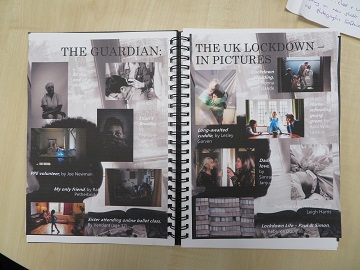 As in other years, many students reported learning how to better manage their time, reference sources, and plan for long-term projects as a result of their qualifications. Yet this year the pandemic also brought unforeseen difficulties, from limited access to printers to not being able to access better kitchen facilities or researching solely from online sources.
As in other years, many students reported learning how to better manage their time, reference sources, and plan for long-term projects as a result of their qualifications. Yet this year the pandemic also brought unforeseen difficulties, from limited access to printers to not being able to access better kitchen facilities or researching solely from online sources.
For many students, however, the pandemic was not just an obstacle, but a source of inspiration and a spur to enquiry. Here, we gather examples of those students who took this project as an opportunity to better understand our times, our relationship to history, or to address consequences of the pandemic— an approach from which we can all learn and draw inspiration.
A Level Photography student Sofia turned her lens on the post-pandemic world to produce a photo book of her experiences of lockdown. Through this project she sought to document this turbulent time, and to sharpen her photography skills. Photographing her surroundings honed her candid photography – an area of her art that she felt was underdeveloped before the project. The result is a beautiful book, charting the pandemic from lockdown to the present, shifting its colour palette from dark to light to fit with these themes.
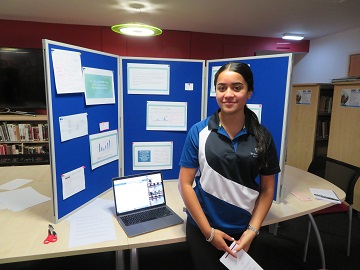 |
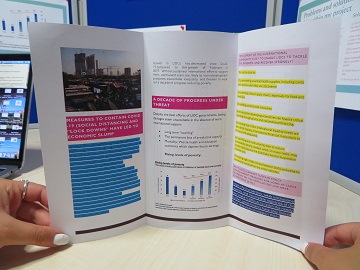 |
Documenting our world in another guise, Ohona K. focused on the devastating impact of Covid-19 on Low-Income Developing Countries (LIDCs), where hospital beds and medical equipment are often in low supply. India formed her central case study, informed by the testimony of her family members who live there. She highlights the lack of support offered to these countries from abroad and aims to present her findings in an accessible and interactive website. This will also feature links to donate to crisis-relief in India and information about what can be bought per donation.
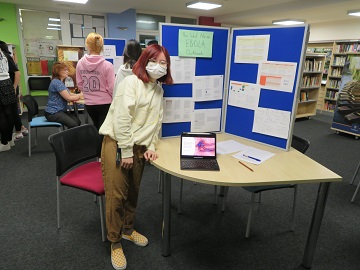 Inspired by the current pandemic, Victoria W. investigated past health crises, exploring what made the 2014 West Africa Ebola outbreak so severe. She investigated the factors that contributed to make this outbreak particularly catastrophic, from politics to the environment and the effectiveness of first responses, with implications for today. Weighing up these factors, she concluded that the novelty of the outbreak heightened lack of understanding around which measures would be effective. The resulting confusion was particularly deadly, especially when combined with the virus’ high transmission rates. This research helped her to draw comparisons with Covid-19 during questions, considering the impact of misinformation and individual choices on recent events. This research aims to bridge her transition to university by building her referencing, long-term planning skills, and allowed her to explore her highly topical interest in virology.
Inspired by the current pandemic, Victoria W. investigated past health crises, exploring what made the 2014 West Africa Ebola outbreak so severe. She investigated the factors that contributed to make this outbreak particularly catastrophic, from politics to the environment and the effectiveness of first responses, with implications for today. Weighing up these factors, she concluded that the novelty of the outbreak heightened lack of understanding around which measures would be effective. The resulting confusion was particularly deadly, especially when combined with the virus’ high transmission rates. This research helped her to draw comparisons with Covid-19 during questions, considering the impact of misinformation and individual choices on recent events. This research aims to bridge her transition to university by building her referencing, long-term planning skills, and allowed her to explore her highly topical interest in virology. 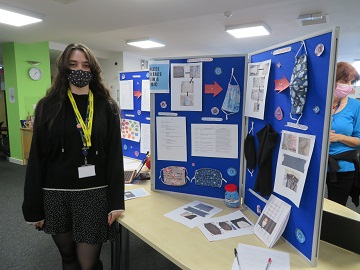
Alice G. combined a similar interest in the science behind pandemics with her love of sewing to produce a complete guide to face masks. This covered all aspects of masks, from their history during plagues and in other cultures, to the science behind their effectiveness, their correct use, and their construction. She produced a series of hand-made masks which experimented with fabrics and design to create her ‘perfect’ mask, with ideal fit and breathable fabric. This project allowed Alice to enjoy sewing and build new textiles skills, while working towards a subject with direct relevance to her desired future university course, Bioscience.
Niamh investigated the psychological impact of the pandemic on people with autism. She was inspired by a desire to learn more about autism and follow her interest Psychology, which she wishes to pursue at university. Interesting dilemmas arose from studying the present, as Niamh found herself with a wealth of conflicting sources. She decided to turn to official government documents to review the impact of Covid-19, and to supplement this research with interviews. Her central case study was an interview with the mother of an autistic child. In her measured report, she noted that while the isolation and stress of the pandemic had caused new difficulties, some children had also experienced certain benefits. Online school lessons, for example, could allow some children to learn in a familiar and less stressful environment, improving their experience.

Kirsty C. explored the effects of social media on people – a topic given even greater relevance by the centrality of social media to staying connected during the pandemic. Having originally set out to study the effects of social media on teenagers, Kirsty’s project developed with further research, as she learned that 18–24-year-olds were the most impacted demographic. Her final product was a research essay, drawn from academic articles and online sources, which assessed both the role of social media on deepening depression and anxiety in certain individuals, and in allowing us to build friendships and stay connected. She explored these phenomena on a personal, local and international scale, comparing social media use and its impact across countries. This project built on her interest in psychology, honed during her iGCSE. Reflecting on the impact of the pandemic on this subject during questions, Kirsty identified new uses of social media, as more people relied on online life to stay connected and informed. Recognising the power of social media for harm as well as good, Kirsty recommends using filtering settings that help to limit contact with harmful information and reduce its potentially negative impact.
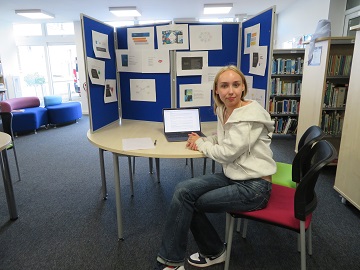
Brooke L. covered the impact of Covid-19 on businesses and especially charity shops. She wanted to explore her interest in business and the pandemic offered an important case study. The results were unexpected. While charity shops, like other businesses, had been hit badly by lack of funds during the pandemic, they had also evolved and adapted in interesting and sometimes beneficial ways. Brooke chartered their first forays into digital advertising and selling on platforms and apps such as ebay and Depop, as the pandemic forced businesses to adapt to the online world.
Other students made sustainability a key theme of their EPQs, inspired by eco-themes emerging from the pandemic. Drawing together fashion, textiles and sustainability, Elizabeth W. experimented with knitting plastics to create a stylish alternative to single-use plastic bags. As her family had accumulated non-recyclable plastic bags from food deliveries during lockdown, Elizabeth wanted to put these materials to good use. The finished product required much research, as she first had to decide the strongest and most durable weave, collecting samples in a book. By undertaking this project, Elizabeth hopes to inspire others to creatively use non-recyclable plastics. In the future, she wishes to continue and expand her designs, perhaps using her weaving for charity purposes, building on existing projects to provide mats for the homeless.
Continuing the theme of sustainable fashion, Laura C. altered a wedding dress to give it new life and reflect current fashions as part of her project on wedding dresses through the eras. The eye-catching display transformed her mother’s 23-year-old wedding dress, moving it through the eras to the present. This idea was the result of research into sustainable fashion, and the particular problem presented by wedding dresses – expensive and elaborate items deigned to only be worn once. She researched other methods of making high-fashion more sustainable, such as reusing fabrics, dress rental, or buying second-hand, before deciding on her final artefact. This project allowed her to build on her existing interest in high fashion and textiles.
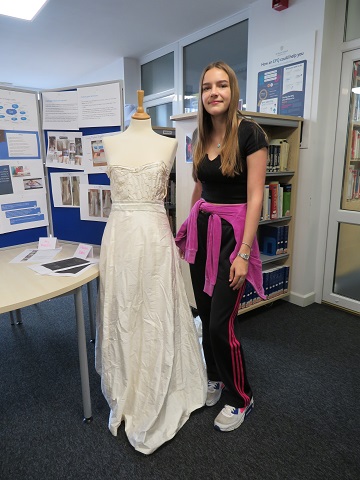
Other students tackled the issue of sustainability in food. Louisa P. wanted to make a difference to poverty and nutrition, having been shocked by statistics on malnutrition in the UK – a problem that has worsened due to Covid-19. She put her love of cooking to use to design a low budget cookbook of cheap nutritional recipes, designed to make healthy eating accessible. She hopes to build on this work by contributing to local charities’ food banks and fridges in the future.
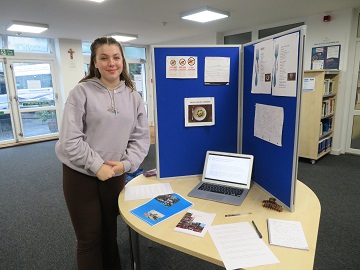
Eloise Q. also produced a cookbook, intended to cut food waste by making high-end zero-waste restaurant food accessible to a wider public at home. She contacted chefs with a documented interest in zero-waste cooking who then contributed recipes for her cookbook, which she published as a book. Cooking and photographing the recipes herself, this project had unexpected benefits, as Eloise’s research taught her about image copyright and food photography.
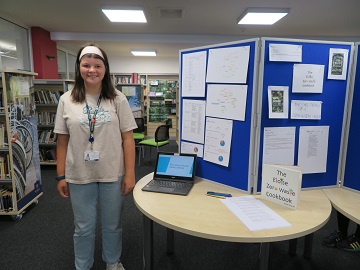
Finally, Jess C.’s project responded to new demands from the pandemic, as well as continuing the theme of sustainable construction. Jess designed and created a new garden hut, renovating an existing structure in her garden. This was intended as an extra space to relax and later to host friends, as the whole family spent more time at home during the pandemic. She oversaw the project from design to execution, even helping to lay the building’s foundations. Shopping sustainably, Jess sourced fixtures and fittings from second-hand shops. She filmed a video of the hut’s construction, from foundations to completion, which she shared during her presentation. Focusing on creating a new space, this project helps build towards her aim of studying Human Geography at university.
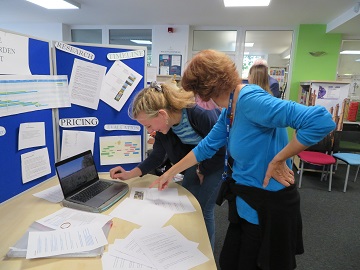 |
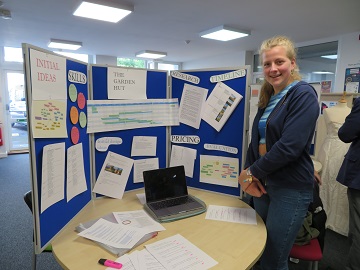 |
Together, these projects form a time capsule of this unprecedented period, and demonstrate the resilience, curiosity and creativity of our Sixth Formers, who used the time and experiences of the pandemic to undertake inventive research.
See more photos of the EPQ presentations here.